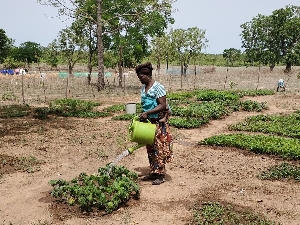As the world commemorates International Women's Day under the theme "Invest in Women: Accelerate Progress," it is crucial to celebrate the remarkable contributions of women across various sectors of agriculture in Ghana and Africa. Women farmers, agriculturalists, entrepreneurs, food traders, and scientists play a pivotal role in driving agricultural development, ensuring food security, and fostering economic growth, yet their efforts are often underappreciated and overlooked.
In Ghana and Africa as a whole, women constitute a significant portion of the agricultural workforce, actively involved in farming, livestock rearing, and agribusiness. Despite facing numerous challenges, such as limited access to land, credit, and agricultural inputs, women in agriculture continue to demonstrate resilience, creativity, and dedication in their endeavors.
Women farmers are the backbone of food production, working tirelessly to cultivate crops, raise livestock, and sustainably manage natural resources. Their hard work and dedication contribute significantly to ensuring food security and improving livelihoods in rural communities.
Women agriculturalists and entrepreneurs play a crucial role in driving innovation and value addition in the agricultural sector. From developing new farming techniques to processing and packaging agricultural products, these women are at the forefront of transforming the agricultural landscape and creating economic opportunities for themselves and others.
Women food traders play a vital role in ensuring food reaches consumers efficiently and affordably. Through their entrepreneurial spirit and market knowledge, they contribute to food security and economic development by connecting farmers to markets and consumers.
Women scientists are instrumental in advancing agricultural research and technology and developing innovative solutions to address challenges such as climate change, pests, and diseases. Their contributions help improve agricultural productivity, sustainability, and resilience in the face of evolving challenges. Investing in women across the agricultural value chain is not only a matter of gender equality but also a smart economic decision. Studies have shown that when women have equal access to resources and opportunities in
agriculture, productivity, and food security increase, benefiting entire communities and economies.
Role of women in meeting Sustainable Development Goals:
Women in agriculture in Africa are key stakeholders in achieving the most important Sustainable Development Goals, including goals 2, 5, 6, 8, 13, and 17.
Food Security (SDG 2): Women farmers and agriculturalists are crucial to ensuring food security for their families and communities. By improving women's access to resources, training, and technologies, they can increase agricultural productivity, reduce food waste, and enhance nutrition.
Gender Equality (SDG 5): Empowering women in agriculture by providing them with equal access to land, credit, and markets can help reduce gender inequalities in rural areas. This can lead to improved livelihoods, increased decision-making power, and enhanced well-being for women and their families.
Clean Water and Sanitation (SDG 6): Women are often responsible for water collection and sanitation in rural areas. By involving women in water management and sanitation projects, communities can ensure access to clean water and improved sanitation facilities, benefiting health and hygiene.
Decent Work and Economic Growth (SDG 8): Women agricultural entrepreneurs and food traders contribute to economic growth by creating jobs, generating income, and promoting local and regional trade. Supporting women's entrepreneurship and access to markets can further boost economic opportunities in rural areas.
Climate Action (SDG 13): Women are particularly vulnerable to the impacts of climate change, but they also play a critical role in climate adaptation and mitigation efforts. By promoting sustainable agricultural practices and empowering women as agents of change, communities can build resilience to climate change and reduce greenhouse gas emissions.
Partnerships for the Goals (SDG 17): Women's participation in decision-making processes at all levels, from local to national, is essential for achieving the SDGs. By fostering partnerships that include women farmers, agriculturalists, entrepreneurs, and scientists, Africa can benefit from diverse perspectives and innovative solutions to complex challenges.
Call to action:
At this point, I would want to focus specifically on women farmers. Women farmers often have limited access to land, credit, and agricultural inputs compared to men. By ensuring equal access to these resources, women can increase their productivity and income, contributing to economic empowerment and gender equality. Also, providing women with education and training in agriculture can enhance their skills and knowledge, enabling them to take on leadership roles and make informed decisions about their livelihoods.
Women in agriculture are often subjected to various forms of violence and discrimination. By addressing these issues and promoting gender-sensitive policies and programs, societies can create a more inclusive and equitable environment for women in agriculture. Women in agriculture often bear the burden of unpaid care work, such as childcare and household chores.
By recognizing and redistributing this work more equally between men and women,
Societies can enable women to participate more fully in economic and social activities. Supporting women agricultural entrepreneurs can create economic opportunities for women and contribute to gender equality. By providing access to markets, finance, and business development services, women can grow their businesses and contribute to economic growth and development.
This International Women's Day, let us celebrate the resilience, ingenuity, and contributions of women farmers, agriculturalists, entrepreneurs, food traders, and scientists in Ghana and Africa. Let us recognize their vital role in driving agricultural development and commit to investing in them to accelerate progress towards a more sustainable, inclusive, and prosperous future for all.
Opinions of Monday, 11 March 2024
Columnist: Miriam Aya Bosomtwe















